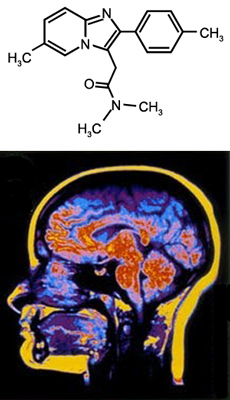New Awakenings
 This is astounding. The sleeping pill zolpidem (sold in the US as Ambien) awakens people in persistent vegetative states as often as 60% of the time.
This is astounding. The sleeping pill zolpidem (sold in the US as Ambien) awakens people in persistent vegetative states as often as 60% of the time.
Across three continents, brain-damaged patients are reporting remarkable improvements after taking a pill that should make them fall asleep but that, instead, appears to be waking up cells in their brains that were thought to have been dead. In the next two months, trials on patients are expected to begin in South Africa aimed at finding out exactly what is going on inside their heads. Because, at the moment, the results are baffling doctors. [...]I see Louis before his daily medication, yet he is conscious where once he would have been comatose. Almost blind because of a separate and deteriorating condition, there is a droop to one side of his mouth and brow because of brain damage. His right arm is twisted awkwardly into his side.
Louis is given a pill, and I watch. It is 8.30am. After nine minutes the grey pallor disappears and his face flushes. He starts smiling and laughing. After 10 minutes he begins asking questions. [...] A couple of minutes later, his right arm becomes less contorted and the facial drooping lessens. After 15 minutes he reaches out to hug Sienie.
These aren't people in regular comas (unconscious, but with measurable low-level brain activity), these are people in PVS, with brain scans showing zero activity in large parts of the brain. After taking zolpidem, these dead sections wake back up.
It appears that the recipients need to take the drug daily to maintain consciousness, but some patients are going on 7 years without any signs of decline (unlike with L-dopa, as in "Awakenings"). It doesn't restore necrotic brain cells, but it does seem to stimulate dormant ones, even in people with non-PVS brain damage. As in:
I meet 22-year-old Janli de Koch, whose eyesight was damaged in a car accident in Switzerland in December 2004. The injury resulted in a restriction of her visual field to two corners of her eyes; she cannot see below a certain point, so that she bumps into things and falls over. Last month, she was prescribed zolpidem and now says she can already see more than she used to.
Recipients are also showing improvement in motor function and balance.
A sleeping pill treatment for vegetative states and serious brain damage. That's just... wow.






Comments
Wow, this is practically science fiction. They would have quite an awkward time if they forgot to take their pill one day!
Posted by: Michael Anissimov | September 12, 2006 10:36 AM
From the article, it appears that there would be a gradual degradation if the patient doesn't continue to take his/her pills, so this is definitely not a cure. That said, one would assume that people in this condition would be highly motivated to remember to take their daily pills.
Posted by: Jamais Cascio | September 12, 2006 10:43 AM
This is hardly surprising to me. On March 12, 1990 it was reported by the University Hospitals in Madison Wisconsin that Valium, which has a similar pharmacological profile, had successfully been used to cause a patient to awaken temporarily from a PVS. Surprisingly it got almost no publicity. I can't even find the original article although the finding was mentioned in the book Pills-a-go-go by Jim Hogshire (on page 65).
Posted by: Clark Herniman | September 12, 2006 8:44 PM
I was hesitant to make a panicked post-Schiavo "pull the plug" contract anyway because of research pointing to new possibilities for 'awakening' in many 'vegetative' cases. I know this is a particular kind of brain damage, and particular treatment, but I am now fully erring on the side of extended medically-assisted life. Keep the tubes in, and try every drug and technique on me for as long as possible until something (or nothing) happens! Just keep trying.
Posted by: Jake Dunagan | September 13, 2006 12:37 AM
The boot signal for the brain.
As the article says, this is not yet a cure for coma but it is a big, and unexpected, step forward.
There is still the quality of life issues to deal with. People often go into comas due to extreme trauma to the brain. Even if these pills wake them up, how damaged will their personality and consciousness be? I suppose a person with severe brain damage is less difficult and expensive to support than a full coma patient but I don't think the controversy over these issues will end.
Posted by: Pace Arko | September 14, 2006 12:10 AM